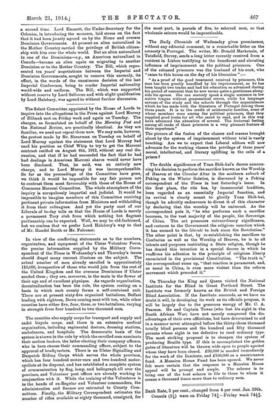The Daily Chronicle of Wednesday gives prominence, without any editorial
comment, to a remarkable letter on the amnesty in Portugal. The writer, Mr. Donald Mackenzie, of
Tatafield, Surrey, sends a long letter recently received from a resident in Lisbon testifying to the beneficent and elevating influence of imprisonment on the political prisoners. One of the released prisoners WAS the husband of his cook, who "came to this house on the day of his liberation" "Ass proof of the good treatment received by prisoners, this man has been greatly benefited by his imprisonment, as he has been taught two trades and had his education so advanced during his period of restraint that he now seems quite a gentleman along- side his spouse. She can scarcely speak a single sentence in her native tongue without grammatical errors, while his language savours of the study and the schools through the acquaintance which he has made with the literature of Portugal during those three years. It is to the credit of aristocratic families, some of whose members were among the political prisoners, that they supplied good books for all who cared to read, and in this way have advanced the education of several. The fraternal feeling among all ranks of these prisoners is a very pleasant feature of their experience."
The picture of the fusion of the classes and masses brought about by the system of imprisonment without trial is vastly touching. Are we to expect that Liberal editors will now advocate for the working classes the privilege of three years' moral, intellectual, and literary uplifting in the cells of • prison P










































 Previous page
Previous page